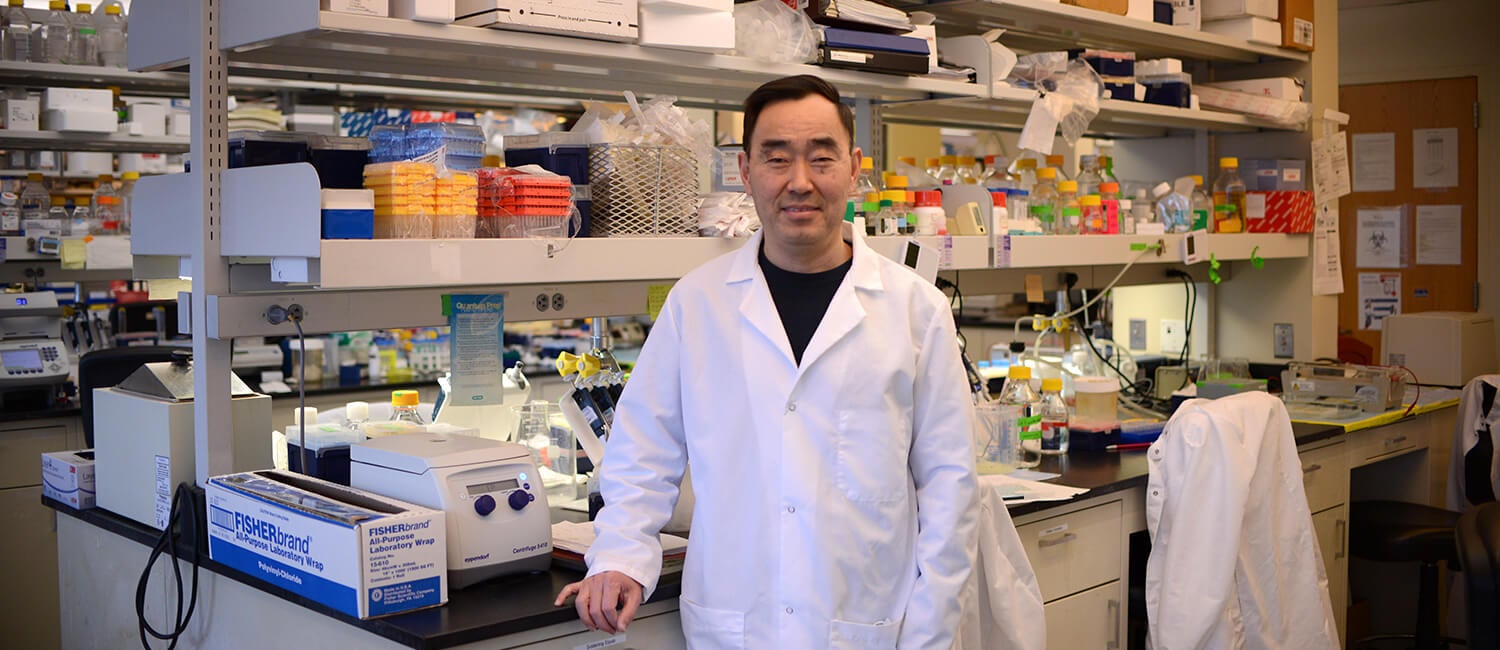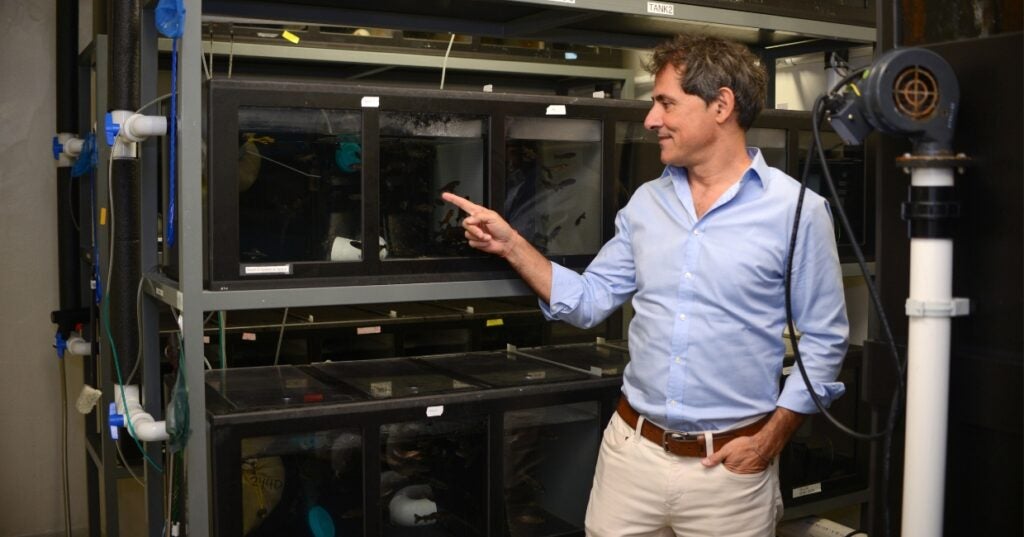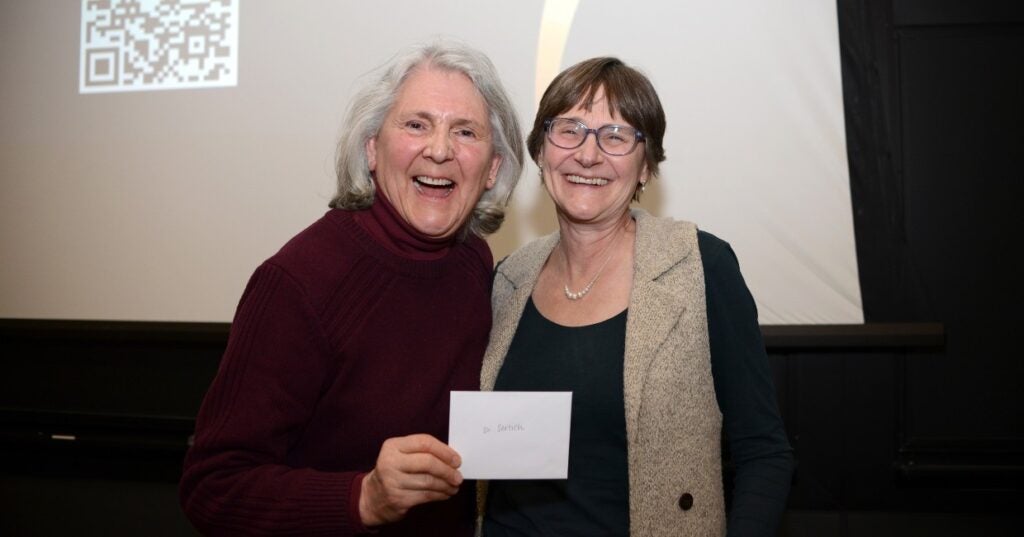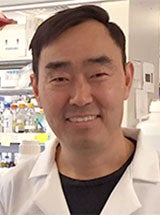P. Jeremy Wang, MD, PhD, Named Ralph L. Brinster President’s Distinguished Professor at Penn Vet

Andrew M. Hoffman, DVM, DVSc, DACVIM, Gilbert S. Kahn Dean of the School of Veterinary Medicine at the University of Pennsylvania (Penn Vet) has named P. Jeremy Wang, MD, PhD, an internationally recognized reproductive biologist, the Ralph L. Brinster President’s Distinguished Professor.
Dr. Wang holds an extraordinary record of scholarly accomplishments. His research program focuses on the cellular, molecular, genetic and epigenetic controls of meiosis, the process of cell division that is unique to germline cells and influences genetic diversity. Wang seeks to understand the generation of gametes through in vitro meiosis that could remedy infertility in animals and humans; and identify abnormal meiosis that can result in spontaneous pregnancy loss or human congenital conditions. He has received NIH support totaling $16 million at Penn and is currently PI on two NIH grants. He has mentored more than 28 students and fellows from across the United States and the world.
“Dr. Wang’s scientific work has appeared in over 60 peer reviewed publications in high-impact journals,” said Ellen Puré, PhD, Chair of the Department of Biomedical Sciences, and Grace Lansing Lambert Professor of Biomedical Science. “His outstanding achievements have garnered him numerous awards, including the prestigious Society for the Study of Reproduction Research Award. Dr. Wang has published in journals such as Nature Genetics, Science Advances, Genes & Development, and Nucleic Acids Research. He is highly sought after by editorial boards and grant review panels, and as a presenter for more than 50 invited and named lectures.”
Wang received his MD from Peking University Health Science Center and his PhD in Molecular Biology and Genetics from Cornell University. Following a post-doctoral fellowship with David C. Page, MD, at MIT’s Whitehead Institute in Cambridge, Massachusetts, Wang joined Penn Vet’s Department of Biomedical Sciences (neé Animal Biology) in 2002 as Assistant Professor of Developmental Biology. His career advanced to Associate Professor, to Professor, and then to Director of the Center for Animal Transgenesis and Germ Cell Research. Wang also serves on the faculty at the Center for Research on Reproduction and Women’s Health at the University of Pennsylvania’s Perelman School of Medicine and at the University of Pennsylvania’s Institute of Regenerative Medicine.
“The Ralph L. Brinster President’s Distinguished Professorship was intended for a prominent reproductive scientist who embodies the passion, rigor, and pioneering spirit of Dr. Ralph Brinster, our eminent faculty member in the same area of study, and National Medal of Science laureate,” said Andrew Hoffman, DVM, DSc, DACVIM, the Gilbert S. Kahn Dean of Veterinary Medicine. “Dr. Jeremy Wang personifies those qualities, and as such, he has been selected among his peers both here at the University and across the globe, to hold this illustrious position. I am delighted to have him on our faculty.”
The awarding of a named, endowed professorship is the highest honor bestowed upon a faculty member at the University of Pennsylvania and reflects a commitment to scientific discovery, mentorship, and service. Established in 2017 through a gift from former Penn Vet Board of Advisor Henrietta Alexander, the Ralph L. Brinster President’s Distinguished Professorship was named in honor of Dr. Brinster, Penn Vet’s Richard King Mellon Professor of Reproductive Physiology.
Related News

Behind the Breakthroughs: J. Oriol Sunyer
J. Oriol Sunyer explores how studying the evolution of the immune system reveals surprising connections between fish and human immunity, and what these discoveries could mean for the development of…

The University of Pennsylvania School of Veterinary Medicine Names Amy Durham, Associate Dean for Education
Andrew M. Hoffman, DVM, DVSc, DACVIM, Gilbert S. Kahn Dean of the University of Pennsylvania’s (Penn) School of Veterinary Medicine (Penn Vet) has announced the appointment of Amy Durham, MS,…

SAVMA Student Teaching Awards 2025
On Friday, April 11, the Penn Vet community gathered to honor students, faculty, and hospital staff during the annual SAVMA Student Teaching Awards. Recipients are selected by the student body…
About Penn Vet
Ranked among the top ten veterinary schools worldwide, the University of Pennsylvania School of Veterinary Medicine (Penn Vet) is a global leader in veterinary education, research, and clinical care. Founded in 1884, Penn Vet is the first veterinary school developed in association with a medical school. The school is a proud member of the One Health initiative, linking human, animal, and environmental health.
Penn Vet serves a diverse population of animals at its two campuses, which include extensive diagnostic and research laboratories. Ryan Hospital in Philadelphia provides care for dogs, cats, and other domestic/companion animals, handling more than 30,000 patient visits a year. New Bolton Center, Penn Vet’s large-animal hospital on nearly 700 acres in rural Kennett Square, PA, cares for horses and livestock/farm animals. The hospital handles more than 6,300 patient visits a year, while our Field Services have gone out on more than 5,500 farm service calls, treating some 22,400 patients at local farms. In addition, New Bolton Center’s campus includes a swine center, working dairy, and poultry unit that provide valuable research for the agriculture industry.

